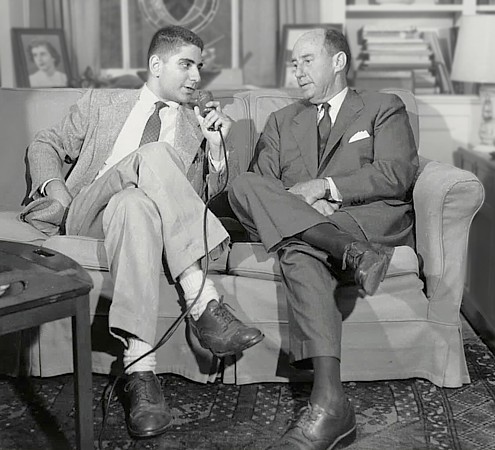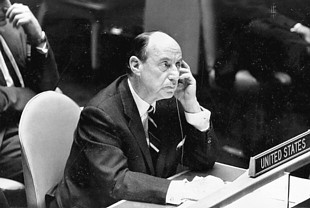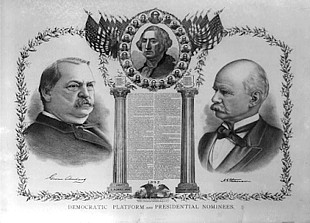Stepping
Back with the Stevensons
Written August 2018
|
Jennifer Wagner (right), who had been one year behind me at Oberlin College and had recently graduated, wrote me from Illinois that month. “Life is hectic as usual,” she reported. “I'm working on Adlai Stevenson (III)'s campaign for Senator, three nights a week and lots of other times too. It's fun — and better than being depressed about having nothing to do.” Jenny's efforts were successful. Adlai III (right), the son of a former Illinois governor, went on to serve in the United States Senate for the next ten years. |
|
|
|
Adlai III's father, Adlai Stevenson II (left), was our Ambassador to the United Nations and participated in a famous Security Council debate. By the way, Adlai III's great-grandfather, the original Adlai (near left), had been Grover Cleveland's Vice President in the 1890s. You can see why some people called this family a bunch of “eggheads.” |
|
On that date, Adlai Stevenson II dropped in at the home of his cousin William E. Stevenson in Oberlin, Ohio. Cousin Bill (right) had won a gold medal in the 1924 Olympics in Paris as part of the 4x400 meter relay team, setting a world record of 3:16.0. He now was the president of Oberlin College. |
|
|
|
The visit to the President's House at 154 Forest Street was described for the student newspaper by George Von der Muhll of the Class of '56. He later became a professor of political science at the University of California, Santa Cruz. |
Von de Muhll's article appeared in the Oberlin Review on September 18, 1954. I've quoted it in gray below.
|
Adlai Stevenson stole into Oberlin early Thursday morning and hid himself so successfully that for 24 hours the College remained unaware of the presence of its famous visitor. |
The visitor had been the Democratic nominee for President of the United States only two years before. Republicans scorned him as an elitist, and they had the more popular candidate: Dwight Eisenhower.
Following his defeat, Stevenson made a world tour in 1953, writing about Asia, the Middle East and Europe for Look magazine. He was still considered the head of the Democratic Party. He was campaigning for its candidates in the midterm elections, and would himself head the national ticket a second time in 1956.
But as of 1954, Stevenson noted, “I haven't even been offered the nomination.” He had a speech to make in Indianapolis on Saturday night, and he needed privacy to write it.
At 1:15 Friday afternoon, the speech was barely finished when a couple of local politicians showed up at the college president's home — along with a “large gathering of local reporters.”
|
“I'm a frustrated newspaperman myself,” Stevenson quipped. “I'd rather talk newspaper than answer questions on politics. My life's ambition was to work for my local newspaper (the Bloomington Pantagraph), but there wasn't room for my cousin and me, so they shipped me off to Chicago and I've been in trouble ever since.” Quizzed on the speech he had prepared for Indianapolis, he revealed “It will be brilliant, as usual!” Becoming serious for a moment, he said that in the speech he would discuss the basic similarities of the two major parties. “There are more ties to unite us than issues to divide us,” he observed. “But I shall also have one or two things to say about the Republican Party which won't be entirely flattering.”
“Well (grinning), all I can say is that he's got three speeches already booked in Illinois.”
“His speeches have been of incalculable aid to the Democratic Party.”
“I feel wholly optimistic. I anticipate a majority in the House of from 20 to 40 seats.” |
The actual number turned out to be 29.
Stevenson also spoke to individual journalists. For example, WOBC radio's Jerry Nelson, a college junior, interviewed him on the president's couch (below).

The Review's reporter Von der Muhll also was granted a one-on-one interview. He asked about a Republican bill to privatize atomic energy. The Democrats tried to block it, but Sen. Lyndon Johnson (D-Texas) had just called off the filibuster. Should this be considered a defeat?
|
“Why, we got everything we wanted. We were able to make several revisions in the bill, including striking out the provision granting private patent monopolies. Besides, I never have liked filibusters, and I felt quite embarrassed when we were forced to use one.” |
Sen. Hubert Humphrey (D-Minnesota), not wanting to abandon the anti-Communist issue to McCarthy's Republicans, had introduced Communist Control legislation in August. Humphrey's bill would have imprisoned for five years anybody who willfully became or remained a Communist Party member. This provision, probably unconstitutional, was later dropped.
|
“I don't like the bill at all, and I told him so at the time.” |
Former President Truman's technical assistance program for developing countries, Point Four, had been in operation for five years. Stevenson said it was a great success as far as it went. He recalled his recent world tour.
|
“It does something to you to walk down a hot, dusty road in Java and find the local blacksmith under a bamboo tree using tools made in Lorain, Ohio. Everywhere I went I found heartening evidence of the results obtained by constructing hydroelectric dams and sanitation projects and administering community self-help projects.” |
The Review reporter wrote, “Stevenson reiterated his faith in the long-range value of economic aid over military aid in checking Communism in Asia, although he conceded that both were necessary. American anti-neutralist campaigns were doing us further harm in India, he warned, and the United States was actually exercising far less leadership than he imagined in Asian affairs. But Asian resentment against Americans arising out of hatred of the white race had been greatly exaggerated.”
|
“It is true, however, that the first question I was always asked was sure to be concerned with our discrimination against Negroes.” |
Stevenson
spent half an hour that day campaigning on Oberlin's Tappan Square,
shaking hands with freshmen and townspeople.
|
|
My family was living in Newark, Ohio, at the time. I stayed in the car that evening while my parents went inside a local armory to mark their ballots. When they got back, I asked them, “So who'd you vote for?” “Eisenhower,” they told me. |







